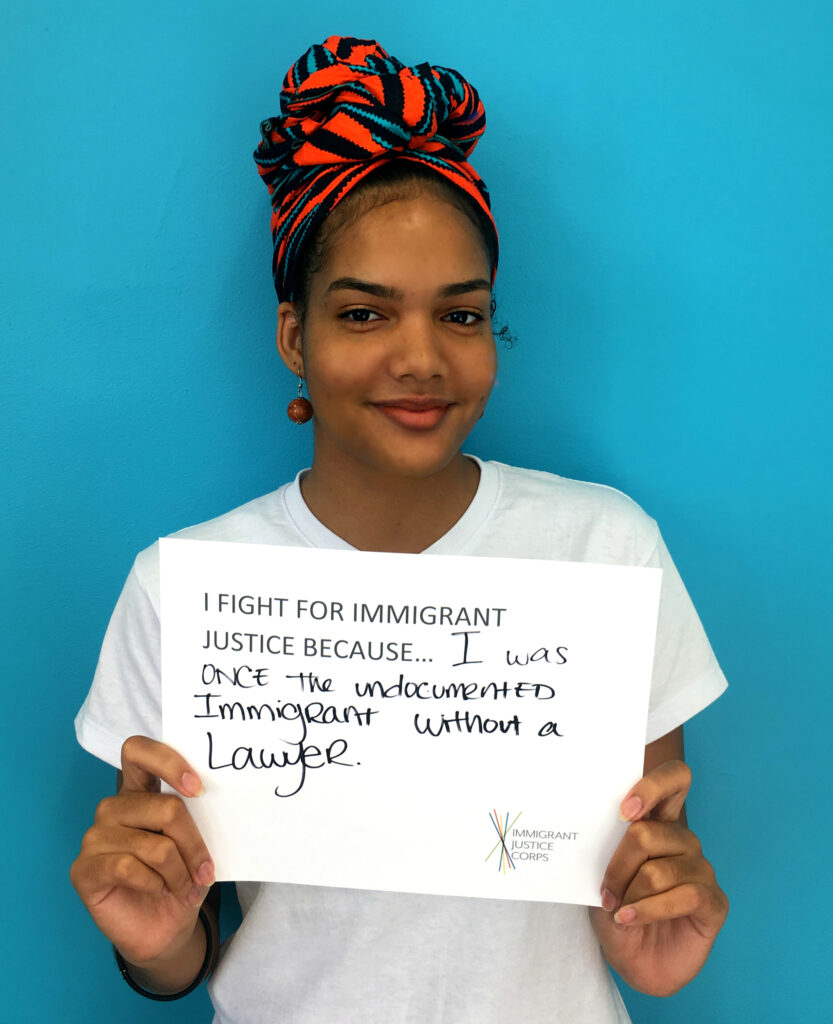A zealous advocate - Bria Leigh Yazic
2023 Justice Fellow Bria Leigh Yazic, a Fellow at the Chacón Center for Immigrant Justice, writes about her first experience representing a client in immigration court for an individual hearing.
Proceedings in immigration court are overseen by an Immigration Judge, who is an employee of the Department of Justice, and prosecuted by trial attorneys, also employed by the Department of Justice. Not governed by the Federal Rules of Procedure, clients are also not guaranteed access to counsel even though these hearings are the linchpin for someone being able to make their case.
Bria walks us through getting to know her client, prepping for the hearing, and what winning the case taught her about her job as an attorney.
Selene was my first client who I represented in immigration court for an individual hearing. She was requesting cancellation of removal.
Cancellation of removal is a way for a person who has been living here for at least ten years without certain criminal issues to receive a green card, provided they can prove that their deportation would cause “exceptional and extremely unusual hardship” to a child, spouse, or parent who is a U.S. citizen or permanent resident.
My supervisor told me Selene would be a lovely client to work with, and I immediately understood what she meant. Selene was sweet, helpful, honest, smart – I adored working with her.
Of course, we had to talk through many of the truly awful things she’d experienced in her life, as well her deepest fears about her children. She told me that some of the things we discussed she’d never voiced to anybody before. She cried often. She was incredibly brave. I was very cognizant of the delicate nature of my role: listen, support, affirm, give space, guide the conversation, push when necessary but not too hard.
As immigration attorneys, we are required to make people grapple with horrific parts of their pasts, in order to prepare them for relaying it all in a courtroom. What a cruel and unfair system that expects individuals to delve into their trauma in front of strangers, revoking their privacy and relying on their worst moments to prove their right to stay in this country. We’re not meant to be therapists, but in this job, the options are to (1) have therapist skills or (2) retraumatize your client. I can only hope that by talking with Selene about some of the trauma she experienced, I did so in a way that helped in her healing process rather than making it worse.
On the day of the hearing, I was so nervous, but I felt it coursing through my veins that I was ready to fight for Selene. At the court hearing, the DHS attorney offered that it would be traumatic and unnecessary for my client to testify, and the judge agreed. It’s rare that DHS comes to that decision – we were surprised, but it meant they found her written declaration credible! This seemed to be a huge relief for Selene, who was palpably nervous. The DHS attorney said she would accept a proffer in lieu of testimony and again, the judge agreed. I hadn’t been expecting a proffer, and neither had my supervisor. We had poured all of our energy into prepping Selene for direct examination.
My supervisor whispered to me, “Give the best summary of your life of what she would have testified.” And so I did. Suddenly I was the ambassador of her story. In that moment, I could feel her next to me as I relayed, slowly and clearly, all the points we had worked through tirelessly for weeks. All the points of the ways her children would suffer without her here. I hope I did her story justice.
When I was done, the DHS attorney stipulated on the spot to cancellation of removal.* I realized we were going to win. But that didn’t make the win any less incredible. I watched tears roll down Selene’s cheeks as the judge told her she had lived a hard life and we had convinced her that her children need her to stay here. We had done it.
This experience taught me how to win a case. But I still fear the day when I learn what it means to lose a removal case. I know cognitively that it’s not my job to save people, it’s my job to zealously advocate and realize that sometimes even the best attorney can’t change the mind of a tough judge or make a weak case strong. Internalizing that concept is something I’ve yet to truly grapple with. In the meantime, I’m just thrilled Selene can finally call the U.S. home.
*This is incredibly unusual as only about 30% of these cases nationwide are approved.
Want to hear from more Fellows like Bria? Visit our Fellow Story page to learn more!
